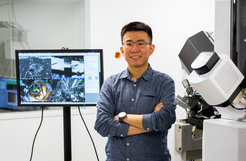Zhexin “Eric” Wang receives the International Birnstiel Award 2022
Max Planck PhD Student from Dortmund is one of six brilliant young scientists awarded
The Max Planck Institute of Molecular Physiology (MPI) congratulates Zhexin “Eric” Wang, former PhD Student in the group of Stefan Raunser on receiving the prestigious International Birnstiel Award for Doctroal Studies in Molecular Life Sciences 2022. In a competitive selection process Eric and five further brilliant young scientists were chosen out of a long list of students from 100 institutions. Eric has just recently received the PhD Prize of the “Gesellschaft für Biochemie und Molekularbiologie” and was awarded the Dortmund Biomedizin-Förderpreis” in 2021.
The International Birnstiel Award for Doctoral Research in Molecular Life Sciences highlights outstanding talent in molecular life sciences and celebrates research successes of young, up-and-coming scientists. Established in 2019, it is awarded annually by the Max Birnstiel Foundation and the Research Institute of Molecular Pathology (IMP). The six awardees will receive a certificate, trophy, and prize of 2,000 Euro at a ceremony in Vienna later this year. Due to this highly competitive selection process, the Birnstiel Award has become a highly prestigious accolade for emerging leaders in molecular life science research.

Before joining the doctoral programme of the MPI in Dortmund in 2016, Zhexin “Eric” Wang did his undergraduate and master’s studies at Imperial College London. He just returned to the United Kingdom to become a postdoctoral researcher in Tanmay Bharat's laboratory at the MRC Laboratory of Molecular Biology (LMB) in Cambridge.
During his time at the MPI Eric has established a new approach to visualise sarcomeres using electron cryo-tomography and cryo-focused ion beam milling and obtained the first molecular picture of mammalian muscle sarcomeres. His 3D reconstruction of the sarcomere reveals the details of the intricate organisation of thin and thick filaments as well as bridging proteins, including a unique double-head myosin conformation. Eric has also determined the first structure of a previously "nebulous" muscle protein, appropriately named nebulin, in its native environment.
“I am really honored to receive this award and I would like to thank my supervisor Prof. Stefan Raunser for supporting me during all these years and beyond. The invaluable experience and memories at MPI Dortmund have shaped me into a better researcher ”, says Erik.
We congratulate Eric and wish him all the best and a successful scientific career!
